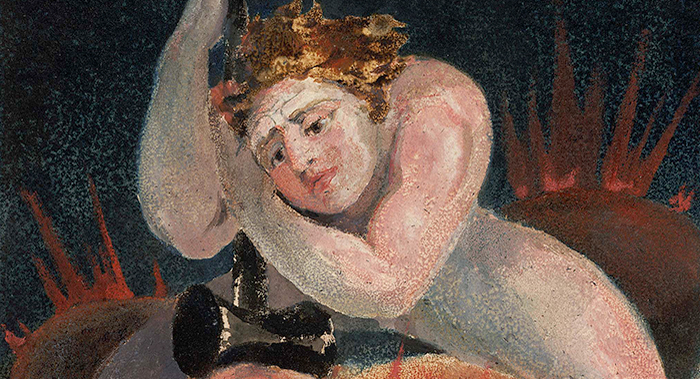William Blake and the History of Imagination: Poetry, Prophecy, and Secularization

Summary
This project compares Blake’s revisionary dialogue with his competitors in the prophetic subcultures that flourished in London in the aftermath of the French revolution. In so doing it traces, amidst the ruins of religious and secular eschatologies (the part of theology concerned with death, judgement, and the final destiny of the soul and of humankind), the emergence of modern discourses of creativity, in which prophets are displaced by artists, truth by poiesis (in philosophy, the activity in which a person brings something into being that did not exist before), and tradition by innovation.
At the conclusion of these metamorphoses it is possible to say, anticipating Nietzsche and Deleuze, that ‘“we the artists” = “we the seekers after knowledge or truth” = “we the inventors of new possibilities of life”’ (Deleuze 2006)
Investigator
Professor Peter Otto (University of Melbourne)
Deleuze, Gilles. Nietzsche and Philosophy 1962
Themes related to this project
Research projects
- Architectures of Imagination: Bodies, Buildings, Fictions, and Worlds
- Azuchi Screens Research Network
- Beyond Identity: Romanticism and Decreation
- British Romanticism and colonial modernity in India, 1780-1840
- Climate Science Denialism and its populist Analogs
- Critique, Creativity, Innovation
- Extremism and the Australian Imaginary
- Gothic Fictions: Emotion, Contagion, and the Transformation of Experience in Modernity
- Human Kind: transforming identity in Australian and British portraits 1700-1900
- Islam and the Left in Indonesia and Turkey
- Kenzaburo Ōe and William Blake: Modernity, Romanticism, Japan
- Literary Romanticism and the Media of Romantic Love
- Natural Born Subjects: A Cultural History of Naturalization in Britain and the Australian Colonies, 1660-1850
- New tastemakers and Australia's post-digital literary culture
- Observation and Analogy in Enlightenment and Romantic Natural History
- Reconstructing museum specimen data through the pathways of global commerce
- Regency Flash: Britain, Ireland and Australia, 1788-1848
- Romantic Worlding
- The Butterfly Men of Kuranda: natural history dealers in the 'deep north'
- The George Lyell Collection
- The Past and Present of Sugar
- The Pasts and Futures of Virtual Reality
- Theorising the online anti-public sphere
- War-Widow, Mother, Slave, Refugee: Andromache in Romantic Europe
- William Blake and the History of Imagination: Poetry, Prophecy, and Secularization
- World Literatures, Theatres and Cultures research network